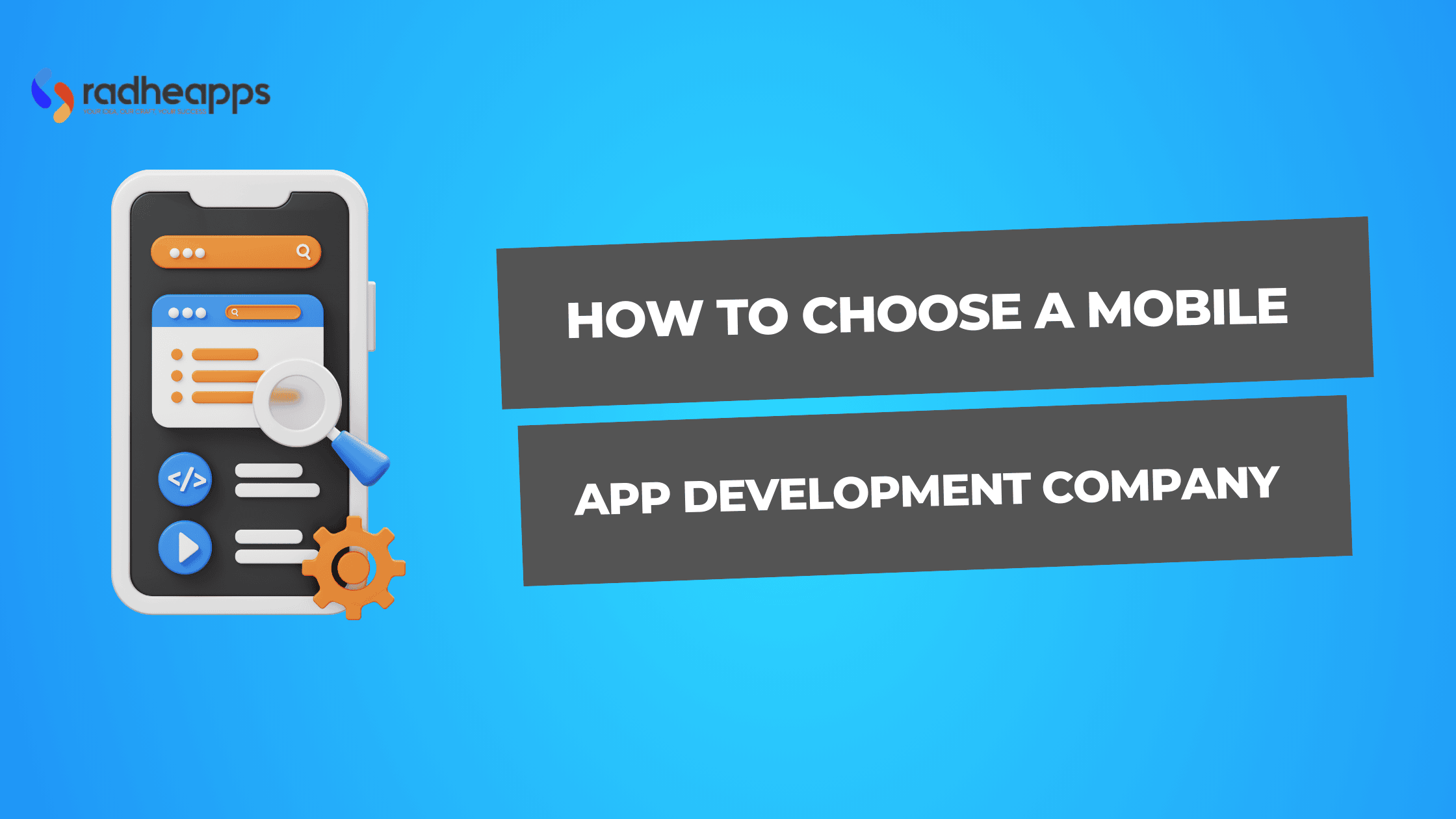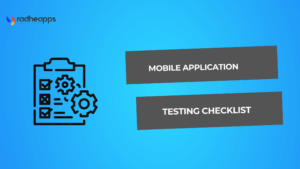According to data, The Global mobile app market is projected to reach $756 billion by 2027.
This indicates the majority of users use mobile apps. It also indicates that the need for mobile app development companies has never been greater.
However, not every entrepreneur or employee is technically skilled, and even if you are, more things are worth your time than developing an app all by yourself. On top of that, Developing your app can be overwhelming. That is why finding an app development company makes more sense. That’s where Radheapps comes in. Contact us today to get started with your mobile app.
In this blog, you will discover why choosing the right mobile app development company matters; you will see the steps to understand your development needs, key considering factors, top questions you should ask from a development company, and answers to some of your most asked questions. Let’s start with the reasoning.
TL;DR – How to Choose a Mobile App Development Company
Here are ten factors to help you choose a mobile app development company:
- Experience and Expertise
- Portfolio and Client References
- Communication and Collaboration
- Technical Skills and Innovation
- Cost and Budget
- Development Process and Methodology
- Post-Launch Support and Maintenance
- Security and Data Privacy
- Scalability and Future Growth
- Reputation and Reviews
Let’s discuss everything in detail.
Why Does Choosing the Right Mobile App Development Company Matter?
Here are the top 5 reasons why it matters and some other additional considerations:
-
Impact on Functionality and User Experience:
Your application’s functionality and user experience are directly proportional to the quality of your chosen app development company.
A good team can develop an intuitive and user-friendly interface that will likely increase user engagement and satisfaction. On the other hand, a well-designed app may result in positive reviews and a reasonable user retention rate.
-
Meeting Project Timelines and Budgets:
The right company will have a proven track record of timely delivery and within budget. Such reliability is essential to businesses that require launching applications to capitalise on market opportunities or align with specific marketing campaigns. Delays and budget overruns can inhibit your business goals.
-
Access to Expertise and Industry Knowledge:
The cycle of new technologies and trends in the rapidly evolving field of mobile app development is constant. Through an experienced development company, you can leverage their industry knowledge and technical expertise so that your app will utilize the latest tools and best practices.
-
Comprehensive Testing and Quality Assurance:
A good mobile app company has a professional group of testers and quality engineers assigned to ensure bugs don’t creep into your code while addressing usability issues that users may face during actual use.
-
Post-Launch Support and Maintenance:
The development process continues once the product is launched. So, as your app gets updated periodically regarding functionality, improvement, or modification, post-launch, ongoing support, updates, and maintenance are essential to keeping the app.
This is why choosing a company that offers robust post-launch services can save you time and resources in the long run.
Additional Considerations:
- Ensure they comply with relevant regulations like GDPR and have protocols to protect user data.
- The company should allow for future enhancements without requiring a complete overhaul, keeping the scalability of the business in mind.
- They should be responsive to feedback and willing to adapt their processes to meet your needs. Ask these questions before partnering with any development company.
Enjoying this article? Consider saving these for later:
Fintech Mobile App Development Services – All You Need to Know
E-Learning App Development Company- A Comprehensive Guide
Steps to Understand Your App Development Needs
When you understand your app’s exact needs, you increase your chances of app success. Here are eight steps to understand your app development needs:
-
Define Your Goals and Objectives:
Clearly define the exact reason you are conjuring making an app in the first place by considering these questions:
- What specific need does my app address?
- Who is my target audience?
- What outcomes do I want to achieve with this app?
Write down specific, measurable goals to guide you in the development process and analyze your success later.
-
Conduct Market Research:
Analyze the available apps in your niche. Find their strengths and weaknesses and identify the gap that your app can fill. Also, provide insights on what your potential users prefer or what hurts them through surveys, interviews, or focus groups. These will guide your app’s features and design.
-
Outline Functional and Non-Functional Requirements:
Describe the precise actions that need to be taken by your application, like registering users, taking payments, or publishing any form of content.
Reflect upon performance, security, scalability, and usability, which determine the user experience.
-
Create a Product Roadmap:
This is like making a roadmap that marks out critical features of the MVP and others for future updates, which shall make you focus on the critical ones during the first launch while planning for enhancements later.
Set realistic deadlines for each development phase so the project does not go off the rails,
-
Design User Experience (UX) and User Interface (UI:)
Craft wireframes or prototypes to visualize how users will interact with your app. It allows you to refine navigation and layout before full-scale development begins.
Ensure your app design is intuitive and user-friendly, as a positive user experience is crucial for retention.
-
Choose the Right Development Approach:
Based on your target audience and budget, follow a structured app development lifecycle to build your app-specific platform, such as IOS or Android, hybrid, or web-based.
Decide the programming languages, frameworks, and tools used in development.
This will affect performance, scalability, and maintenance.
-
Plan for Testing and Quality Assurance:
A comprehensive test plan comprises functional, performance, security, and user acceptance testing to ensure proper quality assurance before launching an application into the marketplace. Beta testers can also provide input and feedback on issues or areas requiring improvements.
-
Prepare for Launch and Post-Launch Support:
Plan how to introduce the app on the respective platforms, App Store and Google Play, and get promoted to your target audience.
Plan for regular updates and bug fixes after launch as well as user support to maintain it running smoothly and addressing all the needs of users.
Key Factors to Consider When Selecting a Mobile App Development Company
-
Experience and Expertise:
Seek out a company that’s built other apps like yours. This experience will help their team understand your target and the problems in your market. Verify if they’re competent in relevant technologies; it doesn’t matter if they’re on native, hybrid, or cross-platform development.
-
Portfolio and Client References:
Review the company’s portfolio to evaluate the quality and diversity of its previous work. Look for apps with very good user interfaces and functionality. In addition, find client references that can give insight into their experiences with the company in terms of communication, project management, and overall satisfaction.
-
Communication and Collaboration:
Effective communication contributes toward a successful development process. Assess how the company has involved you in development, update you on progress, and respond to your comments. Being appropriately responded to by a teamwork culture can significantly contribute to project output.
-
Technical Skills and Innovation:
Check out the technical expertise of the development team. Look for things like programming language, framework, and emerging technology. A visionary company will be open to new, innovative solutions that can improve your app’s performance.
-
Cost and Budget:
Think about this while evaluating potential companies. Even though choosing the cheapest one seems tempting, you must focus on balancing cost and quality. Thoroughly understand their pricing structure, whether they charge a fixed price or hour, and clarify any potential fees for additional features or changes during development.
-
Development Process and Methodology:
Find out about the company’s approach to development (Agile or Waterfall) and how they handle project management. The transparency process, frequent updates, and defined milestones will keep your project on track and schedule.
-
Post-Launch Support and Maintenance:
Make sure the company offers ongoing support after your app is launched. It should include bug fixes, updates, and maintenance services that are important for keeping your app functional and relevant over time.
-
Security and Data Privacy:
According to App Dynamics, 50% of IT professionals agree that security is often an afterthought in application development. That’s why choosing a company that prioritizes security measures is essential. Consider discussing security policies regarding data handling, compliance with regulations like GDPR, and how they protect user data.
-
Scalability and Future Growth:
Consider whether the company can accommodate future updates or expansions of your app.
A good development partner will design your app with scalability in mind, allowing for new features or increased user capacity as your business grows.
-
Reputation and Reviews:
Dive deep into the online reviews on Clutch or GoodFirms to measure the reputation of the company in the market. The positive feedback from the previous clients may give a sense of security in the quality of work delivered by them.
Top Questions to Ask a Mobile App Development Company
Once you have identified the mobile application development company through key considerations and stages to comprehend your development requirements, it’s time to ask questions.
Here are 15 of them you should ask:
- How Much Experience Do You Have in My Industry?
- Can you Share Some Previous Examples of Similar Apps You’ve Developed?
- Why Should I Choose Your Company Over Others?
- What Development Methodologies Do You Go With?
- How Are You Going to Make Sure My App Is Delivered On Time?
- Tell me about your approach to quality assurance and testing.
- Can You Share Client References?
- How Do You Handle Post-Launch Support and Maintenance?
- Tell me what security measures You implement.
- What is Your Approach On User Experience (UX) Design?
- What Technologies Do You Use for Development?
- How do you make sure my app will be Scaleable for future growth?
- What Monetization Strategies Do You Suggest for My App?
- What is Your Feedback-Handling Strategy During Development?
- Can I Talk to Some of Your Previous Clients?
Enjoying this article? Consider saving these for later:
Custom Web App Development – Steps to Build Ideal App
Cross Platform App Development Company – The Ultimate Guide
Common Mistakes in Choosing a Mobile App Development Company
The fact that you are reading this blog means you are either choosing an app development company for the first time or are still less experienced. That is why some mistakes are bound to happen. Not anymore?
Here are ten common mistakes you should avoid by all means:
-
Not Identifying the Need:
Failure to carry out extensive market research at the development initiation stage may eventually result in developing an app that doesn’t necessarily meet user needs. Before creating the app, always validate your idea through appropriate surveys and feedback from relevant users.
-
Picking a Development Company Without Enough Research:
Choosing a mobile app development company or a freelance developer without proper research could lead to a partnership with an inexperienced team. Be sure to review their portfolio, areas of expertise, and client references to ensure they can deliver quality work.
-
Underestimating the Total Cost:
Many businesses need to pay more attention to the full scope of costs associated with app development, including design, testing, marketing, and ongoing maintenance. A detailed budget plan that accounts for all potential expenses is crucial to avoid financial pitfalls.
-
Not Considering Making an MVP:
Skipping the MVP creation can save resources on features that users might want. An MVP ensures you can test the main functionalities and get user feedback before investing in full-scale development.
-
Building a Poor User Interface (UI):
Overlooking UI/UX design can significantly impact user engagement and satisfaction. A well-designed interface prioritizing user experience is essential for retaining users and encouraging positive reviews.
-
Adding Too Many Features:
It is a common misconception that the more features an app has, the better it is. Overloading an app with too many features can overwhelm users and detract from its purpose. Instead, focus on essential features that deliver value.
-
Adding Too Many Mobile Platforms Initially:
Trying to reach both the iOS and Android markets together will double the development costs and complicate everything. It’s generally much wiser to start on only one platform to streamline development and see how users respond before widening that.
-
Not Doing Enough Testing of the App:
Insufficient testing can lead to bugs and performance issues post-launch, damaging user experience and reputation. A thorough testing strategy throughout the development process is essential for delivering a polished final product.
-
Not Taking Feedback:
The software ignores user feedback during development, leading to an app that does not meet the user’s expectations or requirements. Establishing continuous communication channels for offering feedback will enable it to make essential adjustments before launch.
-
The Unplanned Market Launch of the App:
Launching an application with a proper marketing strategy will lead to high downloads and a good app launch. Preplanning marketing will ensure that all concerned people know your app at launch. You have to spread the word.
Frequently Asked Questions (FAQs)
What is the Average Cost of Hiring a Mobile App Development Company?
The cost is generally between $10,000 and $500,000 or more. A basic application might cost between $10,000 and $50,000, and applications that involve complicated functionality might cost over $100,000. Multiple quotes from several companies are usually possible. Companies must have a well-structured price structure when deciding which suits their budget best.
What Role Does App Maintenance Play in the Selection Process?
App maintenance is one of the most critical factors in the selection process of a mobile app development company. After the app launches, support and updates must be maintained to ensure it remains functional, secure, and compatible with new operating systems.
A good development partner should offer post-launch maintenance services like bug fixes, performance monitoring, and feature enhancements. Knowing their maintenance policies and upfront costs will help avoid unwanted expenses later.
How Do I Protect My App Idea During Discussions?
To protect your app idea during discussions with potential developers or investors, consider implementing several legal measures:
- Non-Disclosure Agreements (NDAs): Have any person you disclose your idea to sign an NDA that legally binds them to confidentiality.
- Document Everything: Keep detailed records of your discussions and any materials shared.
- Trademark your App Name: Trademark your app’s name and logo to protect your brand identity.
Provisional Patent File for a provisional patent, if it will apply, to protect your idea temporarily while you further develop it.
Can A Company Handle Cross-Platform App Development Efficiently?
Many mobile app development companies specialize in cross-platform application development using frameworks like React Native or Flutter.
These frameworks allow developers to write code once and run it efficiently on iOS and Android platforms. However, one must consider the company’s experience with cross-platform technologies and its ability to create high-quality user experiences across all devices.
What Are The Common Red Flags When Selecting An App Development Partner?
When selecting an app development partner, watch for these common red flags:
- Lack of transparency: A company is unwilling to share the development process or provide transparent timelines and pricing structures.
- Poor Communication: Difficulty reaching them or receiving vague responses can indicate future issues. A small portfolio lacks relevant experience or does not showcase completed projects, which may indicate inexperience.
- No client references: This is a sign of caution if they can not provide references or testimonials from previous clients. Unrealistic Promise: Be cautious of firms advertising low prices with very cheap deals and no real effort toward a clear understanding of project requirements.




